6 Soccer Defense Tips to Create a World-Class Defense
In many ways soccer is basically chess on a pitch, with a ball thrown in.
Think about it…
You weigh up your opponents. Probe for holes in their defense. And eventually draw them out and try to catch them unaware as you strike swiftly.
And, like chess, there are any number of schemes and strategies a coach might employ in order to win.
For instance, you could:
• Run circles around the opposition with elaborate passing moves à la Barça or Guardiola, going for the jugular with one brilliant, defense-unlocking through ball.
• Use a counterattacking tactic, like the miraculous Premier League winning Leicester City team, absorbing pressure until you spot an opening.
• Or you could just take the direct route and plain overwhelm them with superior skill and physicality much like Bayern Munich like to.
Soccer is very much a tactician’s game…
And like any team sport, victory depends on how best the coach elevates the team’s strengths, while compensating for its weaknesses.
From a tactical perspective, one crucial component for long-term success in soccer is running a good defensive game collectively as a team.
All three of the teams mentioned above were primarily attacking sides, offensively inclined. But each of them had a solid plan for their defensive game, too.
• Barcelona emphasise technical brilliance and mobility, even in defense.
• Leicester City focussed on intense counter-pressing to win back possession.
• Bayern have always been a well-drilled, well-oiled machine, striving for balance at both ends of the pitch.
Point being, if you really want to win in soccer – and keep winning – you CAN’T afford to overlook your defensive game.
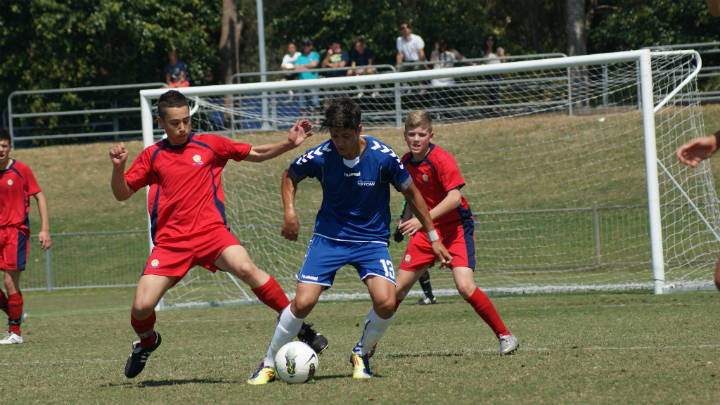
The Importance of a Solid Soccer Defense
Defense is obviously key to any team’s success, though it’s often overlooked. Particularly when it’s working well.
It’s always the defense that gets torn to shreds in the aftermath of a loss, isn’t it?
A team with a well-drilled collective defensive game will always be hard to breakdown, thereby increasing its chances at victory.
It’s simple…
• By improving your defensive game, you limit the opposition’s goalscoring opportunities. That means you can drastically reduce the likelihood of your team losing.
• This also translates into lesser pressure on your attacking players, who consequently play with more freedom, making them more potent.
• Having good defensive skills also gives your team the ability to win back possession quickly, and thus control the momentum at will.
A common misunderstanding, however, is that the defensive responsibilities in a team are restricted to its backline.
Far from it…
Every player on the pitch inevitably has to defend at some point or the other during a match.
And depending on how well prepared your players are for those moments, any one of them can have a telling impact on the game.
It could be the simplest of moves, like a sharp intervention to launch a devastating counter. Or a game-saving tackle in the dying seconds of injury time.
In essence, every player needs to have defensive ability for the team to stay successful.
And to give you an idea of some of the ways you can improve your defensive game, here are six soccer defense tips for you to try out…
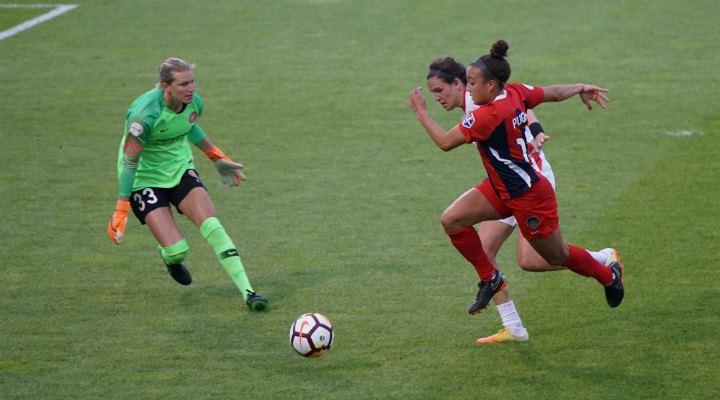
1. Know Yourself and Your Teammates (Strengths and Weaknesses)
Before deconstructing the opponents and their tactics, it’s more important that you turn that scope inwards towards your own team.
Understand your strengths and weaknesses, both individually and collectively. It’s impossible to train properly without doing so.
Knowing your strengths gives you more insight into how best you can exploit them in matches, and how best to adjust your game to make the most of them.
For instance, if you’re particularly athletic, you may be adept at making last-ditch tackles or marking a speedy attacker. Focusing on those skills for your defensive game training could vastly improve your ability to contribute to the team.
If you are a physically imposing defender you may want to let your mark know that you are there by putting in a couple of hefty challenges.
That will make them apprehensive about receiving or holding the ball, reducing their influence on the game.
Similarly, knowing your shortcomings will give you the chance to try and nullify them. Or you can identify and work on other skills or tactics that compensate for the weakness.
As part of a team, however, it’s equally important that players know each other almost as well as themselves.
Knowing a defensive partner’s weaknesses, for example, prepares you to jump in and assist them when they need it.
All of this introspection is essentially preparation. By approaching your training in this manner, you become comfortable and in control of a variety of situations.
And ultimately, you are better equipped to prevent the opposition from exploiting your own weaknesses as well as your team’s.
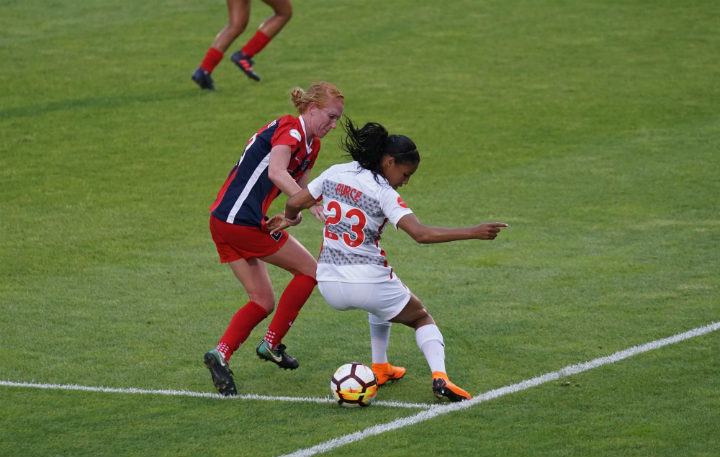
2. Keep Calm and Stay in the Zone
Soccer defense is about being calm and decisive.
By playing with confidence and poise, you put confidence in your teammates that everything is under control.
You know how disastrously infectious jitteriness and panic can be!
If you show negativity, you’re bound to drag down the team’s mood and eventually the entire team’s performance.
With a level head, composure, and discipline, defenders greatly help their teammates in front of them to play their natural game.
By knowing that their teammates are unlikely to concede silly goals, the attacking players will become confident that they can pull off the sort of high-impact, risky moves that swing games.
This positivity is infectious, elevating the entire team’s performance.
Which means better possession of the ball and more influence on the game – and less of those for your opponents.
A great way to keep calm is to have a constant sense of awareness. What does that mean?
• Being aware of your own position relative to the play – Are you in a good position to be at hand when needed? Are you straying out of your assigned zone while following the play? Are you in danger of losing your mark?
• Being aware of the positions of your teammates – Do you know the passing options available to you in case you receive the ball? Can you be better positioned to release the ball quicker in attack, or more safely in defense?
• Always knowing where the opposition players are – Are any of the opposition preparing to make a run in behind? Are you or any of your fellow defenders in danger of being blindsided?
You should keep looking over your shoulder and around you, making mental notes of the changing positions of the others on the pitch.
Heck, don’t even leave out the referee…
Making tactical fouls in the referee’s blindspot may seem tasteless, but it’s an incredibly valuable ability among some top defenders.
And if you’re still unconvinced about having positional awareness of the ref, here’s the world’s best demonstrating its use firsthand...
Having such awareness saves you valuable seconds when you receive the ball and gives you an edge over nearby opponents. You have a greater chance to choose and execute your next move correctly.
In addition to this, by having an idea of where an opposition player is lurking, you can change the way you receive the ball. Either deciding to let it run across you, take a touch, or pass it on in one move.
Stay ahead of the game and you won’t be caught napping!
3. Communicate as a Team
In soccer, the result of a match can change in a split-second…
Switching off for even a moment could mean an opponent nipping in front to get on the end of a cross and score.
So acting immediately on information you obtain from the action unfolding in front of you is a crucial part of your defensive game.
But how do you do all of this as a team?
Maintaining positional awareness of everyone, concentrating on what needs to be done, and acting on things as one is challenging for a group.
That is where ability to communicate effectively in pressure situations comes in.
By constantly communicating with the players around you, you can limit the opposition’s opportunities by making sure that as a team you close down their players, and block the channels they’re looking to run into.
Calling out to each other makes your movements as a team more effective.
And it’s fundamental to coordinated moves such as the ‘gegenpressing’ of Jurgen Klopp’s sides, pulling off offside traps, and cornering key opposition players.
Besides, constant positive communication among teammates keeps the team fired up and on its toes, and reinforces the confidence that comes with working as a team.
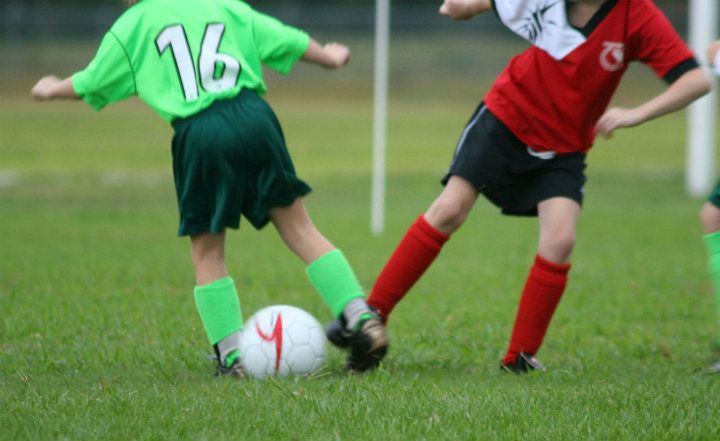
4. Timing is Key – Be Patient
You don’t really appreciate the significance of timing when making tackles until you’ve committed a foul in a dangerous position.
That feeling of helplessness and wanting to kick yourself for messing up is intense…
And usually it’s all because of reasons like:
• Rushing into a challenge
• Panicking at the thought of losing a mark
• Lunging in after a rush of blood to the head
• A communication breakdown with teammates
Taking into account the previous tips, defenders should have confidence in their defensive game, their teammates, and the game-plan.
Doing so should give them sound judgement as to whether or not to commit a challenge.
While in an ideal world your defensive line would be perfectly positioned to block off all attacks, at times you will have the striker pulling away from you into a one-on-one with the keeper, or a skilful winger running right at you.
Committing to a challenge should ideally be your last resort in such a situation.
If you can, you should instead choose a less risky course of action, like:
• Restricting such players to harmless areas of the pitch
• Funnelling them out wide to buy time for your teammates to get back in position
• Force them to do something else by feinting or moving a certain way
By being patient and not diving in, you can force them to act without making yourself and your team vulnerable.
While this works in some cases, at other times you will need to be aggressive and know how to defend in soccer 1v1 (use these drills for practice).
Timing is key here as you want to regain possession or force the ball away from goal.
And to better equip yourself and your teammates to make the right choices in such situations, you need opposition prep…
5. Know The Enemy
While you want to play to your own strengths in every game, that rarely ever happens.
Not unless your team as a whole is at the very top of its game.
More often then not, you will have to change your game-plan to stop your opponent.
And as an individual, too, you need to constantly vary your game to surprise your opponent and win your individual battles.
To come out on top as a defender against attacking players, it’s always ideal to figure out their weaknesses ahead of the encounter, and then use that knowledge to disrupt their game and gain an advantage.
As a defender you can gain an advantage over opposing attackers by knowing things like:
• Whether a player likes to receive the ball into their feet or in space
• If their heading game is on point
• Whether they’re left or right-footed
• Even knowing some useful things about an opponent’s character can give you a psychological edge – like whether they’re irritable, panicky in tight situations, etc.
For example, you can use a tag-team-approach against physically imposing strikers who like to receive and turn inside your box.
Against speedy opponents, you can tighten your marking so they don’t get to run into space easily.
Sometimes, though, you might have to play against teams or players you know little about. And in those situations you will have to learn on your feet - and fast.
With that in mind, make sure you train in a variety of techniques and moves to be able to deal with different kinds of attacking players.
That way you won’t feel helpless in the face of the unknown.
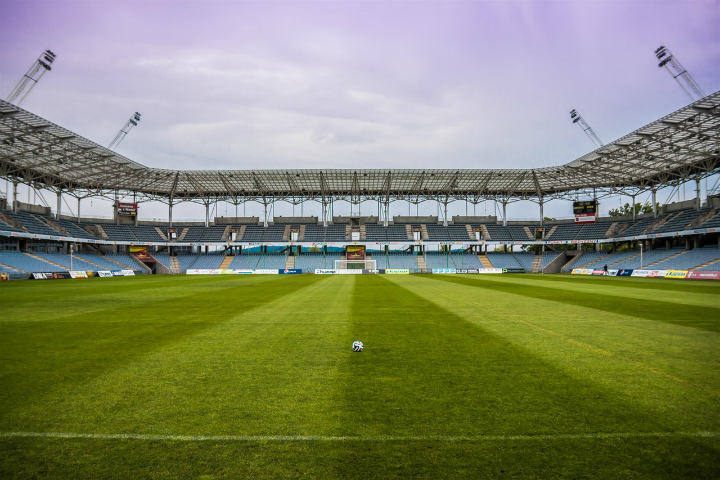
6. Iron-Out Your Weaknesses
Easier said than done, right?
But that was the whole point of tip one…
You discover your weaknesses, and work on erasing them or compensating for them.
How?
By training hard of course.
And when you train with this kind of purpose and prep, you’re training smart.
• Are strikers overwhelming you in physical battles? Head for the gym.
• Are they beating you to the ball too often? You need more explosive speed.
• Losing way too many headers? Work on your jumping height and technique.
• Are you liable to panic or make mistakes under pressure? Practice those scenarios repeatedly, and improve your responsiveness and passing accuracy in tight situations.
And it’s not all physical training, of course.
Like we said before, most of the defensive game is about tactical positioning to gain an edge over the attackers.
You can work on your positioning and reading of the game through simulations and studying the moves of great defenders.
As with everything else, practice makes perfect.
And while you remember to iron out those wrinkles individually, don’t forget that your team defends as a unit. If you’re out of sync, your wall could crumble any moment.
Training together regularly and going through drills of different scenarios is essential for team defense.
Defense is an Art in Itself
Defending in soccer is an art that can be just as entertaining to watch as free-flowing attacking soccer.
The way defenders enjoy their physical battles with the opposition’s strikers.
The heroic backs-to-the-wall defending around the penalty box.
And the whole backline working seamlessly as one unit – beautiful and impressive at once.
These six soccer defense tips will help you to think about your role in the team, and help hone your skills as a defender to come out on top in almost any situation.
And like we said before, improving as a defensive unit frees up your potential in other areas of the game.
By raising your defensive game, you give yourself and your team a heightened sense of security to attack and be confident all over the pitch.
If you put in the work, soon you and your teammates will have mastered the art of defending!
Further Reading: 28 Soccer Training Tips and Secrets to Master the Pitch

